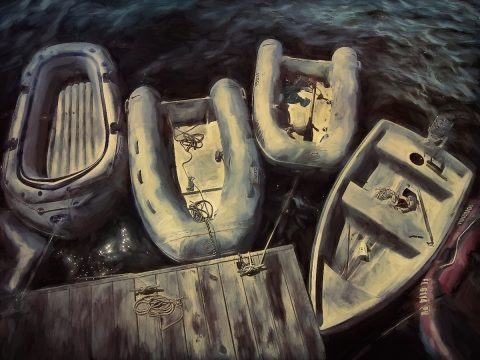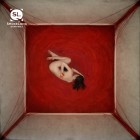In her native Denmark, Lone is known as Lone Landmand (Farmer Lone). She moved away – with her husband – from industrial agriculture to her own organic haven. That move inspired three books: a cookbook, a non-fiction book about nutrition and her debut novel, The Harrowing, which was shortlisted for the Copenhagen Book Fair Prize in 2013. Literary fiction is her favourite genre to write. She loves the satisfaction of creating and evoking images, characters, emotions and ideas through the free combination of words, which the novel’s form allows. Writing the piece for the Global Flash Series was her first time writing flash fiction.
In keeping with the Global Flash Series, the interview is first in Danish with the English translation following.
Historien kunne godt virke som en personlig beretning, men der er også en fornemmelse af, at historien er endnu dybere – var historien resultatet af en personlig oplevelse eller var der noget, du ville opnå med historien?
Historien er fri fiktion, men ikke upersonlig af den grund. Fortællingen er hentet i den underliggende hukommelse af liv – måske en efterrationalisering af alt det ubevidste, der giver mærkbare sindsstemninger gennem livet, men som ikke engang med tiden er til at forstå helt. Deraf kommer nok dybden – en slags bevidsthedsplan man aldrig helt kan gribe. Eller begribe.
Historien har ingen morale, pointe, eller en vigtig betydning at få fat på, men jeg håber, at den vækker noget i læseren – at den vækker følelser. Fordi den er skrevet med det udgangspunkt.
Du skrev i historien: “Et jerngreb der fjernede fornemmelsen for klodens hældning og dagslysets længde og intensitet. En konstant påmindelse om fremtiden og om at udnytte hvert minut. Ikke spilde tiden”. Tid er et central tema for historien – og du er landmand – har det noget at gøre med, at du som landmand har en andenforståelse af tiden og døgnet? Hvordan synes du, vi burde udnytte tiden?
Min forståelse af tiden er som de fleste andres, men min opmærksomhed på tidens rytme er mere intens. Når jeg vågner, fri for brug af vækkeur, er det første vigtige at se, hvordan lyset er. Lyset er pejlemærke for dagen – for vejret, mulighederne og alt det der skal nås med jord, dyr og planter. Lyset og dermed rytmen er grundlaget for liv i det hele taget, og når man lever så tæt på jorden, sætter det ældgamle tidspres sig i én – man skal nå at så, når himlen og temperaturen gør, at frø kan komme i jorden, man skal nå at passe, pleje og drage omsorg for alt levende, og man skal nå at høste, inden vinteren kommer, så både dyrene og vi har mad.
Mange mennesker er præget af at udnytte den mekaniske tid – den målbare. Den der står i hjørnet af deres pc, tablet eller telefon. Den tidsfornemmelse er hårdt struktureret. Meget fjernt fra glæden ved at fokusere på solstrålernes indfaldsvinkel, dagslysets farve og intensitet. En blødere tidsopfattelse giver mere plads til det unødvendige. For mange bliver kravet om ydelse og effektivitet uforeneligt med unødvendige ting – at lytte til musik, se på kunst eller læse bøger. Som menneskehed har vi brug for at styrke alt det, der gør os til mennesker. Åndelig fattigdom følger lige i hælene på vækstsamfundet.
Har du prøvet at skrive flash fiction før? Hvad synes du om denne måde at skrive på?
Dette er min første arbejde med flash fiction; indtil da havde jeg kun skrevet et par romaner samt lyrik. Siden er flash fiction blevet noget, jeg vender tilbage til gang på gang. Kun i vinterhalvåret er der dage med skrivetid her på gården, og denne vinter skriver jeg på en lille samling af de korte historier. Fordi jeg ikke kan lade være.
Formen med de få ord har i den grad vakt min begejstring. Det er en præcis, stram og fokuseret måde at fortælle på. Den kræver al ens opmærksomhed, og hvert eneste ord overvejes for eller imod. Flash fiction virker enkelt at læse, men er forunderligt kompliceret at skrive. Store stemninger og følelser kan skabes under en tekst, som virker stille. Kraftfuld stilhed. Det er en udfordring.
For our readers in English:
This story could easily come across as a personal reflection, but there’s also a feeling that there’s something deeper going on. Is the story the result of personal experience or was there something you wanted to achieve with the story?
The story is free fiction, but that doesn’t mean it’s impersonal. The story is taken from the underlying memory of life – maybe it’s a rationalisation of all which is unconscious, which causes significant moods in life, but which – not even with time – is completely comprehensible. Hence the feeling of depth – a kind of plane of consciousness that you can never quite grasp. Or comprehend.
The story doesn’t have a moral, point or important meaning to grasp, but I do hope that it awakens something in the reader – that it arouses emotions. Because it is written from that starting point.
You wrote in the story: “An iron grip that removed any sense of the planet’s tilt and daylight’s length and intensity. A constant reminder of the future and of taking advantage of every minute. Not to waste time”. Time is a central theme of the story – and you are a farmer – does that have anything to do with farmers perhaps having a different understanding of time and the day? How do you think we should take advantage of time?
My understanding of time is like that of most others, but my attention on time’s rhythms is more intense. When I wake up, without the help of an alarm clock, the first important thing for me is to see where the light is. Light is the day’s guideline – for the weather, for the possibilities and for all that has to be done for the land, the animals and the plants. Light and thus rhythm are the basis for life in general, and when you are so close to the earth, the ancient rhythms become part of you – you have to sow when the sky and the temperature means the seed will take, you have to take care of, tend to and nurture all living things, and you have to harvest before winter comes, so both animals and we have food.
Many people are characterised by utilising mechanical time – the measurable. The time given in the corner of their PC, tablet or phone. That sense of time is very structured, and quite far from the joy of focusing on the sun’s rays, on the colours of daylight and their intensity. A softer sense of time enables more space for the unnecessary. For many, the demands of having to perform and be efficient are incompatible with unnecessary things – listening to music, looking at art or reading books. As humans we need to strengthen all that makes us human. Spiritual poverty follows on the heels of a growing society.
Have you ever written flash fiction before? What did you think of that genre?
This was my first time to write flash fiction. I‘d written a few novels and some poetry before this. But now flash fiction is something I keep returning to time and time again – though only in the winter months, because that’s when there’s time to write here on the farm, and this winter I’m writing a little collection of short stories. Because I can’t help it.
The form of few words aroused my enthusiasm. It’s a precise, tight and focused way of telling. It demands all your attention, and every word has to be considered. Flash fiction seems simple to read, but is strangely complicated to write. Atmospheres and feelings can still be created in a text that works quietly. Powerful silence. That’s a challenge.



 The SmokeLong Grand Micro Contest (The Mikey) is now an annual competition celebrating and compensating the best micro fiction and nonfiction online.
The SmokeLong Grand Micro Contest (The Mikey) is now an annual competition celebrating and compensating the best micro fiction and nonfiction online.